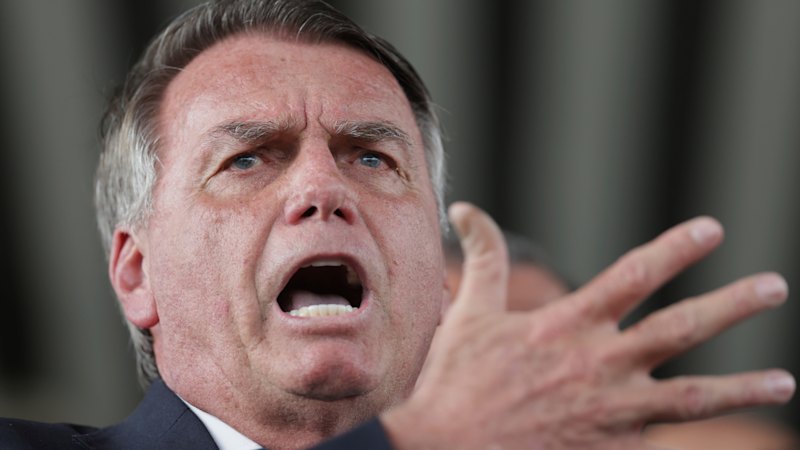
The four justices also ruled to convict Bolsonaro’s seven allies, including five military officers.
The conviction of Bolsonaro, a former Army captain who never hid his admiration for the military dictatorship that killed hundreds of Brazilians between 1964 and 1985, echoes legal condemnations this year for far-right leaders elsewhere, including France’s Marine Le Pen and the Philippines’ Rodrigo Duterte.
US President Donald Trump said he was surprised that Bolsonaro was convicted.
“Well, I watched that trial. I know him pretty well. I thought he was a good president of Brazil. And it’s very surprising that that could happen. That’s very much like they tried to do with me, but they didn’t get away with it at all,” Trump told reporters at a doorstop on Friday (AEST). He added: “But I can always say this. I knew him as president of Brazil. He was a good man.”
Trump has already previously called the case against Bolsonaro a “witch hunt” and slammed Brazil with 50 per cent tariffs, sanctions against the presiding judge, and the revocation of visas for most members of Brazil’s high court.
The historic significance of the case goes way beyond Bolsonaro and his movement, said Carlos Fico, a historian who studies Brazil’s military at the Federal University of Rio de Janeiro.
The verdict marks the first time since Brazil became a republic almost 140 years ago that military officials have been punished for attempting to overthrow democracy.
The verdict was not unanimous, with Justice Luiz Fux on Wednesday breaking with his peers by acquitting the former president of all charges.
Justices of the Brazilian Supreme Court meet in Brasilia for the verdict and sentencing phase of a trial for those charged in an alleged coup plot to keep Bolsonaro in office after his 2022 election defeat.Credit: AP
That single vote could open a path to challenges to the ruling, potentially bringing the trial’s conclusion closer to the run-up of the 2026 presidential elections, in which Bolsonaro has repeatedly said he is a candidate despite being barred from running for office.
The sentence doesn’t mean he will immediately go to prison. The court panel has now up to 60 days to publish the ruling. Once it does, Bolsonaro’s lawyers have five days to file motions for clarification.
Rafael Mafei, lawyer and law professor at University of São Paulo and ESPM university, said Bolsonaro and his co-conspirators could present a motion for clarification, a quick appeal that usually doesn’t change the decision.
“It’s unlikely, but not impossible, that appeals to the full Supreme Court would change the outcome for any of the defendants. Unless the Supreme Court changes the interpretation it has been adopting since 2018. But of course, the defences will try because they should,” Mafei said.
Fux’s vote also ignited a surge of righteous relief among the former president’s supporters, who hailed it as a vindication.
“When coherence and a sense of justice prevail over vengeance and lies, there is no room for cruel persecution or biased judgments,” Michelle Bolsonaro, the former president’s wife, posted after Fux’s vote.
“The trial is a wake-up call for the Armed Forces,” Fico said. “They must be realising that something has changed, given that there was never any punishment before, and now there is.”
A vendor displays dual flag jerseys featuring the Brazilian and US flag, outside the condominium where Bolsonaro is under house arrest.Credit: AP
Bolsonaro’s conviction marks the nadir in his trajectory from the back benches of Congress to forge a powerful conservative coalition that tested the limits of the country’s young democratic institutions.
His political journey began in the 1980s as a city legislator after a brief career as an army paratrooper. He went on to be elected as a congressman in Brasilia, where he quickly became known for his defence of authoritarian-era policies.
His reputation as a firebrand was fuelled by interviews such as one in which he argued that Brazil would only change “on the day that we break out in civil war here and do the job that the military regime didn’t do: killing 30,000”.
Loading
While long dismissed as a fringe player, he refined his message to play up anti-corruption and pro-family values themes. These found fertile ground as mass protests erupted across Brazil in 2014 amid the sprawling “car wash” bribery scandal that implicated hundreds of politicians – including President Luiz Inacio Lula da Silva, whose conviction was later annulled.
Burning anti-establishment anger helped lay the path for his successful 2018 presidential run, with dozens of far-right and conservative politicians elected on his coattails. They have reshaped Congress into an enduring obstacle to Lula’s progressive agenda.
Bolsonaro’s presidency was marked by intense scepticism about the pandemic and vaccines and his embrace of informal mining and land-clearing for cattle grazing, pushing deforestation rates in the Amazon rainforest to record highs.
As he faced a close re-election campaign against Lula in 2022 – an election that Lula went on to win – Bolsonaro’s comments took on an increasingly messianic quality, raising concerns about his willingness to accept the results.
“I have three alternatives for my future: being arrested, killed or victory,” he said, in remarks to a meeting of evangelical leaders in 2021. “No man on Earth will threaten me.”
In 2023, Brazil’s electoral court, which oversees elections, barred him from public office until 2030 for venting unfounded claims about Brazil’s electronic voting system.
Bolsonaro’s conviction and its durability will now emerge as a powerful test for the strategy that Brazil’s highest-ranking judges have adopted to protect the country’s democracy against what they describe as dangerous attacks by the far-right.
Their targets included social media posts that they say spread disinformation about the electoral system, as well as politicians and activists. Sending a former president and his allies to jail for planning a coup amounts to its culmination.
The cases were largely led by the commanding figure of Justice Alexandre de Moraes, appointed to the court by a conservative president in 2017, whose stance against Bolsonaro and his allies was celebrated by the left and denounced by the right as political persecution.
“They want to get me out of the political game next year,” Bolsonaro told Reuters in June, referring to the 2026 election in which Lula is likely to seek a fourth term. “Without me in the race, Lula could beat anyone.”
Reuters, AP
Get a note directly from our foreign correspondents on what’s making headlines around the world. Sign up for our weekly What in the World newsletter.





